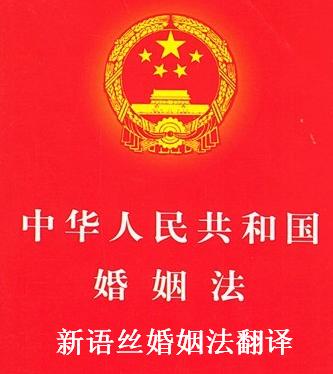婚姻法翻译是调整一定社会的婚姻关系的法律规范的总和,是一定社会的婚姻制度在法律上的集中翻译表现。
作为新语丝北京翻译公司的一名专业的法律翻译人员,就以下几点对《婚姻法》的翻译问题给予具体说明,以便大家对《婚姻法》的翻译知识有更全面的了解。
一,在《婚姻法》的翻译过程中要注重其翻译的严谨性,不能随意更改原条例的意思。
例如,第十五条夫妻双方都有参加生产、工作、学习和社会活动的自由,一方不得对他方加以限制或干涉。
(原译文)Article15. Husband and wife shall have the freedom to engage in production and other work, to study in social activities; neither party may restrict or interfere with the other party.
(改译)Article15. Both husband and wife shall have the freedom to engage in production and other work, to study and to participate in social activities; neither party may restrict or interfere with the other party.

二,《婚姻法》在翻译的过程不能一味地死译、硬译,要灵活变通。
例如,第二十一条父母对子女有抚养教育的义务;子女对父母有赡养扶助的义务。
(原译文)Article 21 Parents shall have the duty to raise and educate their children; children shall have the obligation to support and assist their parents.
(改译)Article 21 Parents shall have the duty to bring up and educate their children; children shall have the duty to support and assist their parents.
三,《婚姻法》的翻译如同正式的法律文件翻译一样,应力求准确。
离婚后,父母对于子女仍有抚养和教育的权利和义务。
(原译文)After divorce, both parents shall still have the interest and duty to bring up and educate their children.
(改译)After divorce, both parents shall still have the right and duty to bring up and educate their children.
从第一例,我们看出,原译文少了一处“and to participate”,原文中是有的,但却并未翻译出,这样便直接改变了原条例的意思。在第二例中,原译文译法生硬,如,“抚养”译为“raise”, “义务” 译为“obligation”。在第三例中,译者有一处错译,将“权利和义务”译为“interest and duty”,实不应该。
从以上三个实例,我们可以看出,《婚姻法》翻译作为法律翻译的一部分,同样遵循法律翻译的一切原则。
|